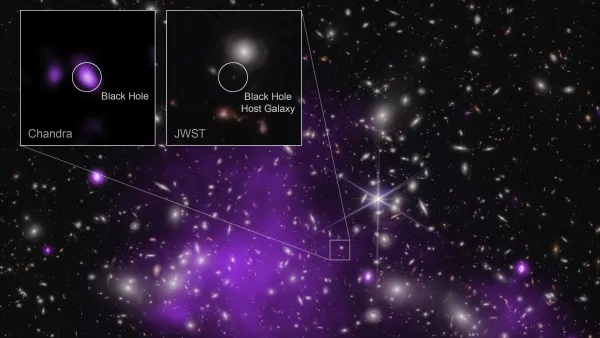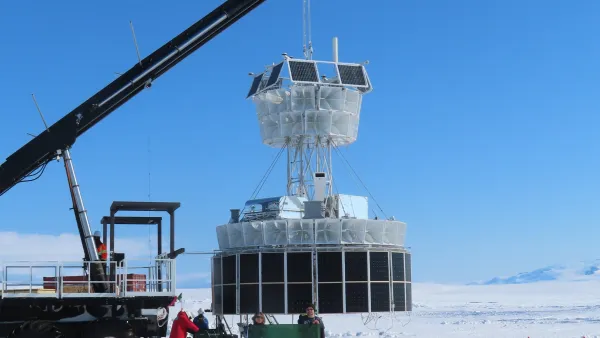Astrophysicist Priyamvada Natarajan will deliver the 2025 McDonnell Distinguished Lectures where she will discuss the formation of black holes and exciting discoveries made with the James Webb Space Telescope.
From a once static and ordinary view, we now perceive a Universe that is expanding at an accelerating pace, driven by dark energy and structured by dark matter. Science remains our most reliable guide to deciphering the mysteries of the universe.

The James Webb Space Telescope (JWST) is on a mission to revolutionize our understanding of the universe by focusing on several key objectives. Designed as the successor to the Hubble Space Telescope, the JWST is equipped with advanced instruments and capabilities that enable it to peer deeper into space and time than ever before. One of its chief scientific goals is to investigate the era of the first stars and galaxies forming just a few hundred million years after the Big Bang. It also seeks to unravel the history of galaxy formation and evolution, tracing how galaxies have grown and changed over cosmic time.
More than a decade ago, Priyamvada Natarajan developed a novel approach to understand a basic mystery in astronomy: How do the supermassive black holes at the centers of most galaxies form? She speculated that they might have gotten a jump start in the very early universe if clouds of gas collapsed to form massive black-hole “seeds” that then grew within their host galaxies over billions of years. The piercing gaze of the James Webb Space Telescope finally observed a galaxy so far back in cosmic time, with a central black hole so massive, that what scientists saw could be explained naturally by her theory.

Image Credit: Stephanie Anestis
Priyamvada Natarajan, an astrophysicist and the inaugural Joseph S. and Sophia S. Fruton Professor in Astronomy & Physics at Yale University, has significantly advanced our understanding of dark matter and supermassive black holes. Her pioneering work in gravitational lensing has mapped the elusive distribution of dark matter, while her research on the assembly history of supermassive black holes has shed light on their growth and interaction with host galaxies over cosmic time. These contributions have made her a leading figure in contemporary astrophysics.
Natarajan's outstanding contributions to astrophysics have garnered numerous prestigious awards and recognitions. She is a fellow of multiple esteemed organizations such as the American Physical Society, the American Astronomical Society, the American Academy of Arts and Sciences, and the American Association for the Advancement of Science. In January 2025, she received the Dannie Heineman Prize in Astrophysics for "groundbreaking contributions to our understanding of dark matter substructure in galaxy clusters, the formation and fueling of black holes, and their feedback into the surrounding environment." Her work earned her a spot on the TIME100 list of the most influential people in the world in 2024. In 2022, she was honored with the Liberty Science Center 'Genius Award.' Additionally, she was the recipient of Guggenheim and Radcliffe Fellowships.
Natarajan will deliver the 2025 McDonnell Distinguished Lectures, starting with a scientific colloquium on April 23 titled, "New Insights into the Formation of the First Black Holes," where she will discuss the latest breakthroughs in our understanding of supermassive black holes (SMBHs). This talk will cover significant advancements such as black hole seed formation via direct collapse illuminated by the capabilities of NASA's JWST, Chandra, and Hubble telescopes; evidence of collective gravitational wave signals from merging SMBHs, captured by global networks of pulsar timing arrays; and the advent of cutting-edge computational methods. On April 24, she will deliver the public lecture, "Unveiling the Invisible Universe with the James Webb Space Telescope," which will provide a deep dive into how JWST is revolutionizing our understanding of the early Universe, particularly in terms of the formation of the first galaxies and black holes.
Brad Jolliff, Director of the McDonnell Center for the Space Sciences, remarked, "Professor Natarajan has made enormous contributions to our understanding of the fascinating astrophysical phenomenon of black hole formation. It is our good fortune to host her for the 2025 McDonnell Distinguished Lecture Series."
Associate Director and astrophysicist Michael Nowak adds, “She is equally well known for her leadership in NASA advisory panels that have helped to map out the future directions of astrophysical research, and just as importantly she has a keen ability for explaining complex phenomena to general audiences both in popular writing and presentations.”
Natarajan expressed enthusiasm about the upcoming lectures, saying. "It is a pleasure and privilege to give the 2025 McDonnell Distinguished Lectures at the intellectually vibrant McDonnell Center for the Space Sciences at WashU. I am eagerly looking forward to sharing the new breakthroughs and insights that Webb in concert with Chandra and the Hubble Space Telescope is providing that are rewriting our current understanding of the assembly of the first galaxies and black holes."
Priyamvada Natarajan’s contributions to astrophysics are not just reshaping our comprehension of the universe but are also inspiring future generations of scientists. Her work underscores the significance of curiosity-driven research and the continuous quest for knowledge, making her a true luminary in the field.




